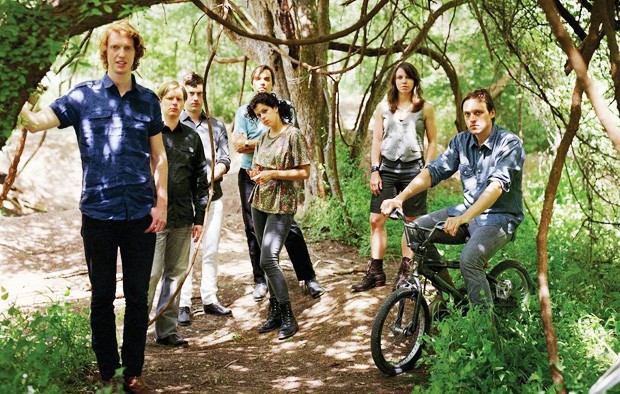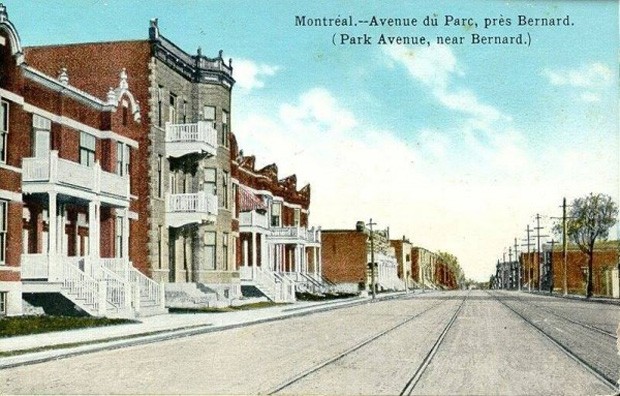Anglos in Montreal: the cultural connection
 Grammy-Award-winning Montreal rock band Arcade Fire includes three Concordia graduates.
Grammy-Award-winning Montreal rock band Arcade Fire includes three Concordia graduates.
How do Anglophones contribute to Montreal’s arts scene?
Running from May 12 to 13, a bilingual conference, Connect and Disconnect: Anglophones, the English Language and Montreal’s Creative Economy, aims to examine the links between English-speaking communities and the economy of the province’s cultural sector.
The event is part of the 84th congress of l’Association francophone pour le savoir (Acfas), which includes 51 researchers from Concordia.
Anglophone culture
“Quebec’s English speakers have a high participation rate in the arts, culture and heritage sectors,” says Lorraine O’Donnell, conference organizer and affiliate professor with Concordia’s School of Community and Public Affairs (SCPA).
“We want to learn more, through our conference, on how Anglophone culture practitioners work and make a living,” she says. “What challenges and situations do they encounter?”
More Montreal music
“When asked if I wanted to be part of this event, I jumped at the chance,” says Will Straw, director of the McGill Institute for the Study of Canada (MISC) and professor in art history and communication studies at McGill.
“There is really interesting scholarly work being done now on English culture in Quebec that has broken free of the sense of resentment and feelings of vulnerability that dominated these questions for so long,” says Straw, who also has students presenting at the conference.
Straw will participate in a panel discussion on music and the English-language music scene in Montreal.
“What you find is that, while these musical communities often have a very high involvement of Anglophones, there are also new kinds of collaboration across the barriers of language,” he says. “Music, I think, is particularly effective in bridging linguistic boundaries.”
 Colorized postcard, ca. 1910. BAnQ, P547S1SS1SSS1D002P1771R. | Image courtesy of Mile End Memories
Colorized postcard, ca. 1910. BAnQ, P547S1SS1SSS1D002P1771R. | Image courtesy of Mile End Memories
Walk and talk
In addition to panel discussions, the conference will head out into the city, with two walking tours.
One, organized by the Mile End Memories group, will examine the intercultural creative economy of the Mile End neighbourhood.
The team behind the Under Pressure international graffiti festival and the Fresh Paint Gallery have designed a second tour of street murals associated with Montreal’s English-speaking communities.
Both walks were mapped out especially for the conference. “Getting out into the city will provide participants with a really unique, active way of seeing and even entering some important sites of the English-language creative economy in Montreal,” says O’Donnell.
“We’ll see public art and buildings linked to the English-language theatre, gaming and music economies.”
Other highlights will include a keynote by Blue Metropolis festival founder Linda Leith. “She’s a dynamic actor in the creative economy who now runs Linda Leith Publishing, an important English-language publishing house in Quebec,” says O’Donnell.
Multiple partners and audiences
The conference is organized by the Quebec English-Speaking Communities Research Network (QUESCREN), a joint initiative of the SCPA and the Canadian Institute for Research on Linguistic Minorities (CIRLM).
“We co-organize many events with academic and community partners from both the English-speaking and the Francophone communities,” says O’Donnell, who is the coordinator-researcher for QUESCREN.
“Our events make research available to specialist and generalist audiences.”
The individuals responsible for putting together the two-day conference are Straw, Anne Robineau, assistant director of CIRLM, and Patrick Donovan, a PhD student at Université Laval who also works with QUESCREN.
These four plus Paul Zanazanian, assistant professor at McGill, and Cheryl Gosselin, professor at Bishop’s University, make up the program committee.
The event is supported by organizations including the CIRLM, the English Language Arts network (ELAN) and MISC.
Conference connections
And while conference goers may come for the discussion, O’Donnell says many wind up establishing connections that last long after the event ends.
“Our conferences are scholarly but also animated and fun,” she says. “At our events, we have seen the start of new friendships and research collaborations across disciplines and language groups.”
“Whether it’s for research, to network or to view a side of the city you haven’t seen before, the conference is a stimulating and timely event.”
Register for Connect and Disconnect: Anglophones, the English Language and Montreal’s Creative Economy, taking place on May 12 and 13 at the Université du Québec à Montréal, the Rialto Theatre and around Montreal.
Registration starts at $105.65 for students.


